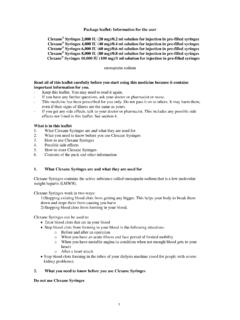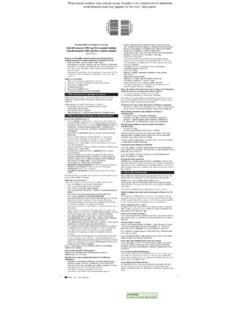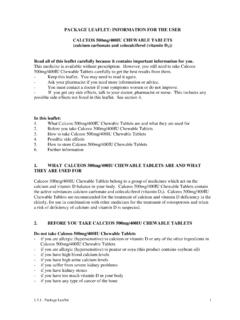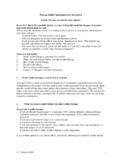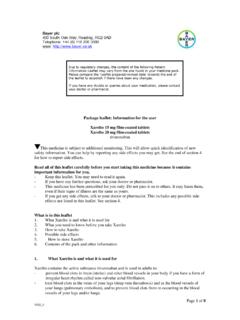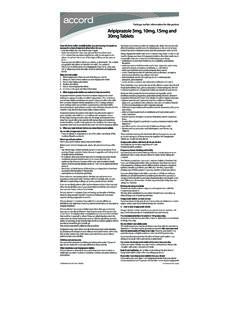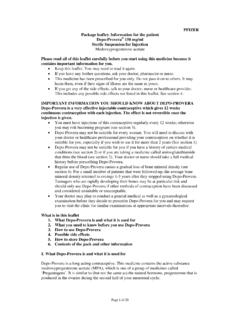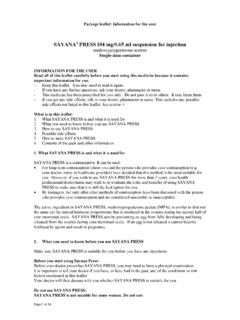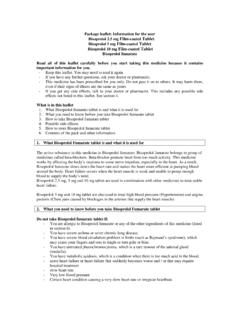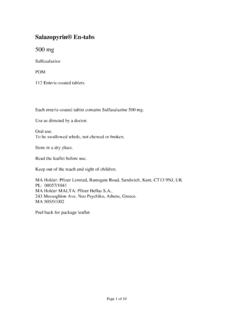Transcription of Package leaflet: Information for the patient Adcal-D3 ...
1 Package leaflet: Information for the patient Adcal-D3 Chewable Tablets Calcium carbonate (1500 mg) and vitamin D3 (400 ) Read all of this leaflet carefully before you start taking this medicine because it contains important Information for you. Keep this leaflet. You may need to read it again. If you have any further questions, ask your doctor or pharmacist. This medicine has been prescribed for you only. Do not pass it on to others. It may harm them, even if their signs of illness are the same as yours.
2 If you get any side effects, talk to your doctor or pharmacist. This includes any possible side effects not listed in this leaflet. What is in this leaflet 1. What Adcal-D3 is and what it is used for 2. What you need to know before you take Adcal-D3 3. How to take Adcal-D3 4. Possible side effects 5. How to store Adcal-D3 6. Contents of the pack and other Information 1. What Adcal-D3 is and what it is used for Adcal-D3 contains calcium and vitamin D3 which are both essential for healthy bones and teeth.
3 Adcal-D3 provides extra calcium and vitamin D3 to your diet. It is therefore used in conditions where your body s calcium and vitamin D levels need to be increased. Adcal-D3 can be prescribed by doctors for certain bone conditions, for example, osteoporosis. Studies show that taking calcium and vitamin D3 over a long time can prevent hip and other non-vertebral bone fractures in later life. 2. What you need to know before you take Adcal-D3 Do not take Adcal-D3 : if you are allergic to calcium carbonate, vitamin D3 or any of the other ingredients of this medicine (listed in section 6) if you are allergic to peanut or soya.
4 Adcal-D3 contains soya oil. Warnings and precautions: Talk to your doctor or pharmacist before taking Adcal-D3 . Tell your doctor or pharmacist if you: Have high levels of calcium in your blood (hypercalcaemia) or high levels of calcium in your urine (hypercalciuria). If you are unsure your doctor will advise you. Have problems with your kidneys, for example kidney stones. Have sarcoidosis (inflammation that produces lumps of cells in various organs in the body), your doctor will be able to tell you if you do.
5 Have previously been told by your doctor that you have an intolerance to some sugars. Are taking any other medication, even those you may have bought for yourself without prescription. Other medicines and Adcal-D3 Tell your doctor if you are taking calcium supplements or antacids for indigestion, digitalis drugs (eg. Lanoxin), diuretics or corticosteroids. If you are taking thyroxine, bisphosphonates, iron or fluoride medicines, tetracycline or quinolone antibiotics make sure your doctor knows this.
6 When taking these medicines leave a period of about 4 hours before taking your Adcal-D3 tablets. Do not take them at the same time. Tell your doctor or pharmacist if you are taking, have recently taken or might take any other medicines. Pregnancy and breast-feeding In pregnancy or when breast feeding, Adcal-D3 should only be used under medical supervision. Ask your doctor or pharmacist for advice before taking any medicine. Adcal-D3 with food This medicine should not be taken within 2 hours of eating foods rich in oxalic acid ( spinach and rhubarb), phosphate ( bran), or phytic acid ( whole cereals).
7 Important Information about some of the ingredients of Adcal-D3 Adcal-D3 contains a small amount of sugar and may be harmful to the teeth if used for a prolonged period. Adcal-D3 contains soya oil. If you are allergic to peanut or soya, do not use this medicine. 3. How to take Adcal-D3 Always take this medicine exactly as described in this leaflet or as your doctor has told you. Check with your doctor or pharmacist if you are not sure. Adults, elderly and children over 12 years of age: 2 tablets daily, ideally one tablet taken in the morning and one in the evening.
8 Adcal-D3 tablets should be chewed. Do not swallow whole. Children under 12: Adcal-D3 must not be given to children under 12 years old. If you take more Adcal-D3 than you should You should only take what your doctor recommends. If you take too many Adcal-D3 tablets contact your doctor or pharmacist if you can do so. If not, go to the nearest hospital casualty department immediately, taking the Adcal-D3 pack and remaining tablets with you. If you forget to take Adcal-D3 If you forget to take your tablet, take it as soon as possible and continue to take the tablets as normal.
9 Do not take a double dose to make up for a forgotten tablet. If you stop taking Adcal-D3 Always talk to your doctor or pharmacist before stopping using Adcal-D3 . If you have any further questions on the use of this medicine, ask your doctor or pharmacist. 4. Possible side effects Like all medicines, this medicine can cause side effects, although not everybody gets them. Frequency not known (frequency cannot be estimated from the available data): Allergic reactions symptoms include itching, wheezing, rash, swelling of the tongue or throat.
10 If you have an allergic reaction stop taking the tablets and seek medical attention immediately. Rare side effects (may affect up to 1 in 1,000 people): Constipation, wind, feeling sick, stomach ache, diarrhoea. Skin rash. Hypercalcaemia (too much calcium in your blood) or hypercalciuria (too much calcium in your urine). If you are on long term treatment your doctor may, from time to time wish to check the level of calcium in your blood and take urine samples to monitor kidney function. Reporting of side effects If you get any side effects, talk to your doctor or pharmacist.
